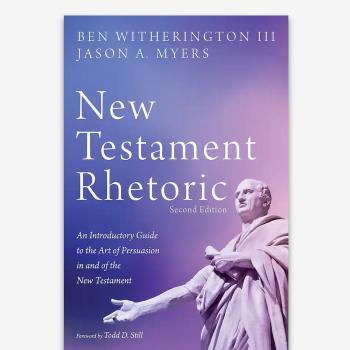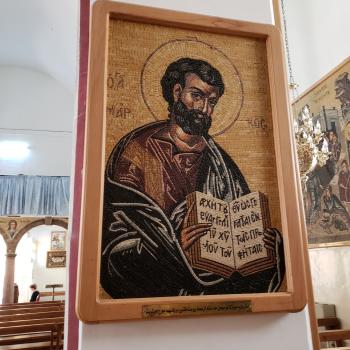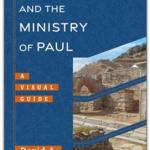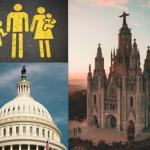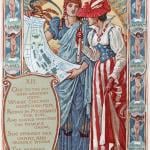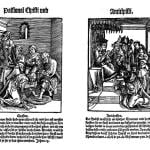Chapter Thirteen is valuable not least because Tom establishes beyond reasonable doubt, that Paul when it talking about the sacraments, prayer and in general Christian praxis does have one eye on how his Gentile converts would have thought about ‘religio’. Despite modern Protestant polemics, Paul is not anti-religion, indeed he is arguing that the Jesus movement is a form of religion that binds people together into a community centered on the worship of a deity, and sharing in the life of that deity. But as Tom says (see pp. 1344ff.) there is a counter-cultural dimension to this ‘new’ religion, not least in its exclusive claims about who is God and how he should be worshipped. Furthermore, the community being formed is different for the rituals of this new community do not reincode the stratified hierarchal society of the Greco-Roman world, but in fact seek to create a community that breaks down walls between rich and poor, Jew and Gentile, male and female, slave and free etc. The central meal— the Lord’s Supper is intentionally very different from the Greco-Roman meals where the pecking order of society is reinforced by where one sits, with whom one sits, and what one gets to eat. No, says Paul, we are deconstructing that whole system— everyone should wait for everyone else, and everyone should be eating together and eating the same food.
There is a useful discussion of koinonia language by Tom, and I would stress that this word should not be translated fellowship, rather it refers to the sharing in common of something with someone, or the participating in common in meal with someone, in this case. The analogy with sharing in the table of demons, reminds us that Paul assumes that Christ is present with the eucharistic meal, and it is in his life that the believers in Christ share. What that precisely means, Paul does not tell us in detail.
I disagree with Tom’s analysis on p. 1346 which suggests everyone must have been bringing their own food to the common meal. No, it was the responsibility of the host to provide the food, but unfortunately, he seems to have assumed that it would be business as usual, with the well to do getting the better stuff, and the earlier stuff, perhaps before the workers and slaves had even arrived (notice we are talking about an evening meal, an evening gathering of the body of Christ). I agree with him however that the phrase ‘recognizing the body’ probably doesn’t refer to the actual elements of the Lord’s Supper, but rather to the community which is the body of Christ. The meal is meant to unify the group, not reinforce their divisions!
Was the Lord’s Supper a Passover meal? Tom thinks it might have been closely related to it (p. 1347). I have my doubts. Christ is ‘our’ Passover, not a recapitulation or rehearsal of the previous one. Besides this, there is no evidence that the Lord’s Supper involved a sacrificed lamb, though it’s not impossible. The bread and the cup are what are said to be central to the Lord’s Supper, and nothing else. I do however agree that the Lord’s Supper was far more than just a memorial meal, like pagan memorial meals for the deceased. I also agree that the Lord’s Supper involved the reciting of words of Jesus and traditions about the night he was betrayed. Paul was not anti-tradition, especially not anti-early Christian tradition. It is not clear to me however that Paul in addition tried to relate the Lord’s Supper in any detailed way to Exodus traditions, if by that one means taking over Israel’s traditions about the first Passover and turning them into a Christianized form of the ritual. It is precisely the new element— this is my body, this is my blood, which has no parallel in the ancient Passover meal, that Paul focuses on when talking about the Lord’s Supper. Indeed, as Tom also suggests, the Gentiles would have seen this as rather like the meals in pagan temples where the god is present and one dines with the deity.
P. 1349 provides the interesting suggestion that Paul is careful about the naming of the deity in prayer and confessions. including in the marana tha prayer, because the ancients did indeed believe that if you want a deity to listen, you had to call him by the right name and pronounce the name right. There is also an interesting comment on glossolalia in this context, to the effect that of course ecstatic speech was not unique to early Christian praxis, it did not mark off Christianity from pagan religion in several forms (see the oracle at Delphi). He finds it ironic, rightly so, that today some Christians take speaking in tongues as what does mark off genuine religion from other religions, and/or more mature spirit-filled Christian faith from less mature Christian praxis. Paul however wants order in worship, not ‘holy anarchy’ as Tom puts it. He is right, and it is always a dangerous thing to assume that what the Corinthians were doing was either the norm or normal form of early Christian praxis, or that Paul had no problems with the way they exercised their gifts. Clearly 1 Cor. 14 shows that he did have some issues with that. “Paul in any case expects public worship to include psalm singing and teaching as well as revelations, tongues and interpretations” (p. 1350). Exactly right. Paul is not anti-traditional liturgy.
The image of Paul the pure charismatic who kept receiving late words from God on a daily basis as to what he should do, takes a hit on pp. 1350-51. As Tom says, Luke does not portray Paul as receiving supernatural guidance. Indeed, he shows Paul sometimes feeling his way along, and making mistakes on discerning where he should go next and evangelize. “Many of Paul’s decisions about where to go next and when to move on, seem to have been taken on what we might think of as purely pragmatic or common-sense grounds, not least when he was being physically threatened or attacked and deemed it prudent to leave town in a hurry.”(p. 1350). In other words, God would use circumstances and providence, and the occasional revelation to nudge Paul along in the right direction. Tom is also right to stress that unlike pagan religion, Paul does not depend on either auguries or lot casting or consultations of oracles for guidance, but he certainly relies on detailed study of the Scriptures, something that distinguishes the Judaeo-Christian tradition from pagan religion.
In short, we must talk about both similarities and differences between pagan and Christian ritual and religion, and one thing that distinguished Christian religion from both Jewish and pagan religion was no animal sacrifices. None. Which in turn meant no need for a class of priests, or for that matter a series of temples either. It was in meals, and prayers, and language about the deity, and in the function of the gatherings for worship and unifying the community that there were similarities to both Judaism and pagan religion.
Tom’s summary statement on p. 1353 bears repeating: “‘religio’ in this sense stands in relation to ‘theology’ somewhat as the steering wheel of the car stands in relation to the map. They are not the same thing and cannot be collapsed into one another. But they need each other. Without religio theology might remain an abstract exercise.” Paul is not undertaking the task to announce the death of all ‘religion’, or to announce that Christianity is a superior religion. Rather he is announcing God’s new actions in Christ, and so a sort of unique eschatological religion which can’t really be compared with other religions in its essence. A religion without actual priests, actual sacrifices, and actual temples is rather incomparable. But would it have been seen as more like philosophy? That is part of what the next chapter is about in Tom’s book.









